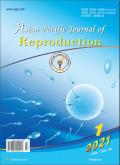Quality of life of infertile couples in the Gaza Strip, Palestine
IF 0.6
Q4 REPRODUCTIVE BIOLOGY
引用次数: 1
Abstract
Objective: To investigate the quality of life of infertile couples who seek in vitro fertilizations (IVFs) by gender in the Gaza Strip, Palestine. Methods: A cross-sectional study was conducted, from February 2019 to November 2019, among 383 infertile couples selected through convenient sampling. A valid and reliable Arabic version of the fertility quality of life questionnaire (FertiQoL) was used in data collection. One way analysis of variance and independent t-test were applied to compare between males and females. Results: The mean age of males and females was (34.54±8.54) years and (29.28±6.71) years, respectively. More than half of them had university degree (64% and 60%, respectively). The mean duration of infertility was (5.66±3.54) years. The mean males’ scores of FertiQoL and its subscales (emotion, mind/body, social, core, tolerability, and treatment) were significantly higher than females’ scores (P<0.05). Conclusions: Males have higher scores of FertiQoL and its subscales than females. The mean score of FertiQoL increases with better education, but decreases with increase of age, duration of marriage, duration of infertility and number of IVF attempts. Routine psychological assessment and counseling are necessary for infertile women taking into considerations factors affecting their quality of life.巴勒斯坦加沙地带不孕夫妇的生活质量
目的:调查巴勒斯坦加沙地带按性别寻求体外受精(IVFs)的不孕夫妇的生活质量。方法:于2019年2月至2019年11月,采用方便抽样的方法对383对不孕夫妇进行横断面研究。使用有效可靠的阿拉伯语版生育生活质量问卷(FertiQoL)进行数据收集。男女间比较采用单因素方差分析和独立t检验。结果:男性平均年龄为(34.54±8.54)岁,女性平均年龄为(29.28±6.71)岁。超过一半的人拥有大学学历(分别为64%和60%)。不孕的平均持续时间为(5.66±3.54)年。男性在FertiQoL及其各分量表(情绪、身心、社会、核心、耐受性、治疗)的平均得分显著高于女性(P<0.05)。结论:男性的FertiQoL及其各分量表得分均高于女性。FertiQoL的平均得分随着受教育程度的提高而升高,但随着年龄、婚姻持续时间、不孕持续时间和IVF尝试次数的增加而降低。考虑到影响不孕妇女生活质量的因素,常规的心理评估和咨询是必要的。
本文章由计算机程序翻译,如有差异,请以英文原文为准。
求助全文
约1分钟内获得全文
求助全文
来源期刊

Asian Pacific Journal of Reproduction
Veterinary-Veterinary (all)
CiteScore
1.70
自引率
0.00%
发文量
588
审稿时长
9 weeks
期刊介绍:
The journal will cover technical and clinical studies related to health, ethical and social issues in field of Gynecology and Obstetrics. Articles with clinical interest and implications will be given preference.
 求助内容:
求助内容: 应助结果提醒方式:
应助结果提醒方式:


